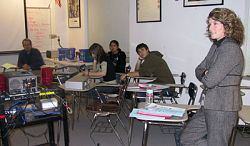Parents learn the signs of teen dating violence

DRAPER — In order for teens and young adults to protect themselves, and parents to protect their teens from dating violence, they must recognize the warning signs. "Dating Violence/School Violence" was one of six sessions parents and students could attend at the Healthy Lifestyles Awareness Night at Juan Diego Catholic High School Jan. 31. The session was presented by Kristen Steenblik, victim advocate coordinator for the Draper City Police Department, and Joey Wolfe, a victim advocate volunteer. The definition of teen dating violence is the use of physical violence, threats, emotional abuse, harassment, or stalking to control a dating partner’s behavior. Teen dating violence may include intimidation, terrorizing, rule-making, isolation, dominating behaviors, harassing, and injurious behavior to control and manipulate the actions of their dating partner. Steenblik said parents and teens should know the warning signs which include: unexplained injuries, fear of a partner, a partner who checks up on a teen, verbal abuse such as name calling and demeaning comments by a partner, a teen who gives up things that are important such as school, friends, time with family, activities, and interests, a teen who apologizes for a partner’s behavior, a partner who abuses other people, animals, or things, and a change in a teen’s appearance or behavior. A verbal abuser will insult a victim in public, yell, use sarcasm or make demeaning jokes, make degrading or negative comments like, "You’re stupid," "You’re ugly," "You can’t do anything right," twist a partner’s words, and lie. An emotional abuser will use personal information against a partner, blame a partner, not accept responsibility for his or her actions, and play mind games. Abusers blame their victims and make them feel as if it is their fault. Other emotional signs of abuse include constant interrogation, dirty talk or sexually degrading jokes, sexualizing a partner in public, denying a partner access to a phone, threatening suicide or to harm oneself, damaging a partner’s possessions, telling a partner how to think or feel, focusing only on one’s own agenda, and using the silent treatment. Teens need a strong adult role model in order to break the cycle of domestic violence. The main ingredients of domestic violence are anger, drugs, alcohol, and a violent parent or guardian as a role model. The violent behavior begins with parents or guardians fighting or arguing in the home. Children will often follow these patterns and act them out in school. This abusive pattern often carries over into the teenage dating years. The reasons for abuse are power and control, jealousy, peer pressure and gender roles, abuse during childhood, insecurity, and uncontrollable anger. A victim stays in an abusive relationship because he or she has hope it will get better, fear of the partner, and love for the partner. He or she feels trapped and often lack resources, and a victim bonds with an abuser. Steenblik said the teen dating violence cycle is the same as the domestic violence cycle. The cycle and definition of teen dating violence has three stages. In stage one, tension builds in minor conflicts when one partner becomes moody and is easily agitated. This causes the other partner to feel like he or she is walking on eggshells. Threats of violence may increase. Stage one may last from a couple of hours to months depending upon the pattern frequency. In stage two, violence erupts from the tension building in stage one. One partner explodes into emotional, verbal, physical, or sexual abuse. The violent partner throws objects, hits, slaps, kicks, chokes, or uses weapons against the other partner. Once the attack starts, there is little the victim can do to stop the other partner. Stage three is a period of remorse or reconciliation. This is called the "honeymoon" phase. The abusive partner may apologize excessively, swear to never let it happen again, may sometimes give gifts, and may express guilt or shame about their actions. The victimized partner may experience many different emotions from anger to love to confusion. The victimized partner wants to believe the abusive partner will change, but because the abusive partner has not received domestic violence treatment, he or she cannot truly change. There is a lapse in time, but soon stage one begins again. Every time that occurs, the violence could become more severe. Parents of victims need to take calm positive action, ask questions, and listen to their teens. They must set limits, yet respect their teen’s choices, and keep the channels of communication open. They must avoid struggles with their teen, manage their own frustration, deal with anger, resolve conflicts, and set up a safe plan. Parents of abusive teens can get help by recognizing the abusive behavior, confronting the teen’s abusive behavior, contacting the parents of your teen’s partner, and seeking help and support for you and your teen. The Domestic Violence Information Line is toll-free 1-800-897-5465, from 8:30 a.m. to 9 p.m. The 24-hour Utah Rape Crisis Center toll-free number is 1-888-421-1100.
© Copyright 2025 The Diocese of Salt Lake City. All rights reserved.

Stay Connected With Us